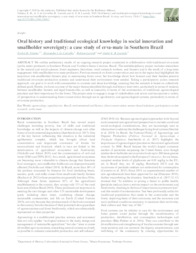Oral history and traditional ecological knowledge in social innovation and smallholder sovereignty: a case study of erva-mate in Southern Brazil.
Oral history and traditional ecological knowledge in social innovation and smallholder sovereignty: a case study of erva-mate in Southern Brazil.
Author(s): NIMMO, E. R.; CARVALHO, A. I. de; LAVERDI, R.; LACERDA, A. E. B. de
Summary: We outline preliminary results of an ongoing research project conducted in collaboration with traditional erva-mate (yerba mate) producers in Southern Paraná and Northern Santa Catarina, Brazil. The multidisciplinary project includes researchers in the natural and social sciences, forest engineers, historians, rural outreach workers, and farmers and is the result of a long-term engagement with smallholder erva-mate producers. Previous research on forest conservation and use in the region had highlighted the important role smallholder farmers play in maintaining forest cover, but knowledge about how farmers and their families perceive traditional erva-mate production systems and understand their environment were needed. Taking a participatory action research approach, our goal is to work with communities to cocreate and share knowledge, ensuring that the research is based on collectively defined goals. Herein, we focus on some of the major themes identified through oral history interviews, particularly in terms of tensions between smallholder farmers and legal frameworks, as well as insecurity in terms of the continuation of traditional, agroecological practices and their importance for the forest. The project aims to engage a range of stakeholders and actors and incorporate a variety of perspectives in understanding forest conservation through use in agroforestry and agroecological systems, particularly in terms of erva-mate production.
Publication year: 2020
Types of publication: Journal article
Unit: Embrapa Forestry
Observation
Some of Embrapa's publications are published as ePub files. To read them, use or download one of the following free software options to your computer or mobile device. Android: Google Play Books; IOS: iBooks; Windows and Linux: Calibre.
Access other publications
Access the Agricultural Research Database (BDPA) to consult Embrapa's full library collection and records.
Visit Embrapa Bookstore to purchase books and other publications sold by Embrapa.

